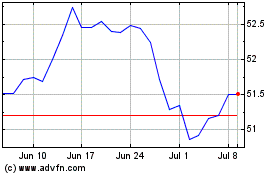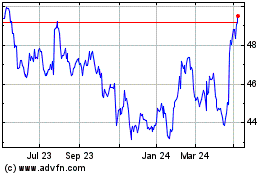By Saabira Chaudhuri
Unilever PLC, the maker of Hellmann's mayonnaise and Dove soap,
named Alan Jope to replace longtime Chief Executive Paul Polman as
it, like the rest of the industry, grapples with a sharp shift in
consumer tastes.
The appointment of Mr. Jope, a Unilever lifer who currently
heads its beauty and personal-care division, comes amid the
company's push under Mr. Polman to bolster that higher-margin
business and pivot away from slower-growing food.
The job, which Mr. Jope will start Jan. 1, is one of the
highest-profile posts in corporate Europe. The leadership change
also is the latest in a series of high-profile departures of
consumer-goods bosses -- an unprecedented changing of the guard as
the industry faces down a raft of challenges.
Unilever and its peers face increased competition from local
brands, rising commodity costs, volatile emerging markets and
fierce competition from Amazon.com Inc. and discount chains that
are increasingly launching own-label products. On top of this, last
year Mr. Polman was forced to fend off an unwelcome $143 billion
takeover approach from Kraft Heinz Co.
Unilever hired an executive-search firm last November to help
find a successor to Mr. Polman, a former Procter & Gamble Co.
and Nestlé SA executive, who has led the company for a decade.
Mr. Jope, a Scotsman, was seen as a leading candidate to be
Unilever's next CEO. He has led the company's largest division
since 2014, regularly presents to investors, and has experience in
emerging and developed markets across both food and personal care.
He joined the Anglo-Dutch company as a graduate marketing trainee
in 1985.
Mr. Polman -- an outspoken Dutchman with a passion for the
planet -- in an email to staff said his work going forward would
include helping the private sector on sustainability issues.
Under Mr. Polman's leadership, Unilever has shifted toward
faster-growing segments in personal and home care while jettisoning
lagging food businesses like spreads and pasta sauce. During his
tenure as CEO, Unilever made about 50 acquisitions, according to
Chairman Marijn Dekkers. The company has also put more emphasis on
sustainability, launching projects in areas including nutrition,
gender equality and plastic packaging.
On a call with reporters Thursday, Mr. Dekkers indicated that
Mr. Jope would broadly continue the strategy laid out under Mr.
Polman but will have to adapt it to meet a fast-changing
landscape.
"Consumer preferences are changing continuously on the food and
personal and beauty care side so Alan will in his new role face a
new set of opportunities and challenges," he said.
Mr. Polman, since fending off the Kraft approach, launched share
buybacks, raised margin targets, further shuffled Unilever's
portfolio and accelerated a restructuring to make the company more
agile. Unilever's stock rose strongly during his tenure and
continues to outperform rivals.
But Mr. Polman was often divisive, riling some shareholders by
appearing to spend more time thinking about global sustainability
issues than Unilever's performance. Mr. Polman derided the
investment community as being too focused on the short term.
"In my spare time I happen to be the CEO of Unilever, and in my
full-time job I am trying to create a little different form of
capitalism," he said at a conference in San Francisco in
September.
In a note to clients, Bernstein analyst Andrew Wood said that
while some investors disliked Mr. Polman's "preachy" style about
sustainability issues and thought he had a "god complex," he
thought Mr. Polman had been "an exceptionally good CEO of
Unilever."
This fall, Mr. Polman was roundly criticized after ignoring
opposition from several prominent British shareholders to his plan
to ditch Unilever's London headquarters and consolidate the
company's base in the Dutch city of Rotterdam. Ultimately, Unilever
scrapped the move in an embarrassing U-turn for Mr. Polman.
Mr. Dekkers on Thursday said the board continues to believe that
simplifying Unilever's dual-headed structure will accelerate growth
and is in the best interest of shareholders. "We will take our time
to consider what's next," he said.
Mr. Jope, 54, is well liked within Unilever. A person who has
worked closely with him described Mr. Jope as having a far more
amiable style than Mr. Polman, saying he is "warm, very funny and a
real people person." Mr. Jope is less focused on financials than
Mr. Polman and is more of a "classic marketeer" with experience
building brands, the person added. In his spare time, the
London-based Mr. Jope goes on long motorbike rides and plays
soccer.
Under Mr. Jope, Unilever's personal-care arm bought online
razor-delivery startup Dollar Shave Club and made a string of other
small deals in areas including high-end skin care. Mr. Jope also
expanded Dove, rolling out a new line of baby products from wipes
to moisturizers under the brand. He pushed Dove deeper into men's
products and launched new brands like Love, Beauty and Planet to
appeal to millennials.
Mr. Polman will stay on to assist with the transition through
the first half of next year, the company said.
RBC analyst James Edwardes Jones described Mr. Jope as "a deep
thinker about his category," saying the incoming CEO's biggest
immediate challenge is whether to retain the financial targets set
for Unilever under Mr. Polman for 3% to 5% sales growth and an
operating margin of 20% by 2020.
"We think these targets are not going to be easy to achieve and
constrain Unilever's freedom of action," said Mr. Edwardes
Jones.
Mr. Dekkers said there are no indications that Unilever won't
achieve its targets. "That's not a confirmation but it's an
indication that we are on track," he said.
Write to Saabira Chaudhuri at saabira.chaudhuri@wsj.com
(END) Dow Jones Newswires
November 29, 2018 09:33 ET (14:33 GMT)
Copyright (c) 2018 Dow Jones & Company, Inc.
Unilever (EU:UNA)
Historical Stock Chart
From Mar 2024 to Apr 2024

Unilever (EU:UNA)
Historical Stock Chart
From Apr 2023 to Apr 2024
